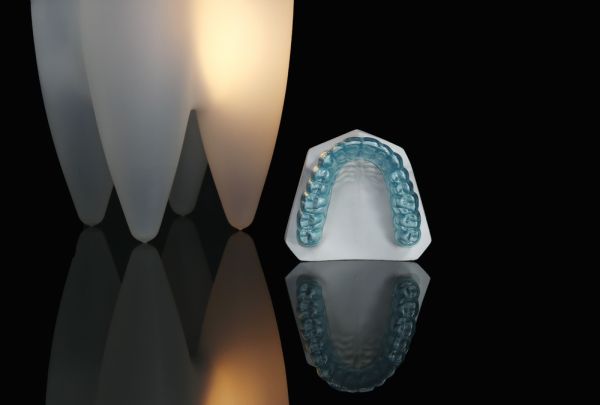What Can a Night Guard Protect My Teeth Against?

Also called a mouthguard, a night guard is used to protect the teeth from the impacts of grinding or clenching during sleep, and from damage when playing sports. They are also effective for snoring and obstructive sleep apnea.
It may be hard to fathom how a plastic material can stop the pain and damages caused by teeth grinding. The fact is that nightguards have been proven to be highly effective for protecting the teeth. Patients must understand that the night guard will only shield the teeth, but will not stop the grinding and clenching. Bruxism is the result of another condition which needs to be treated.
The dentist will create a custom night guard for the patient using an impression of their teeth. This ensures the night guard fits snugly on the teeth, better than over-the-counter mouthguards, and makes them more comfortable to wear and harder to dislodge during sleep. Although they are more expensive than the mouthguards sold in stores, they are usually more effective.
Functions of the night guard
The night guard is effective for protecting your teeth against teeth grinding:
Also called bruxism, teeth grinding is a condition where the patient grinds their upper and lower teeth against each other. This could cause different problems, such as jaw pain, tooth pain and sore gums. It can also damage the teeth. Wearing a night guard before sleeping will help separate the upper and lower teeth, so they do not get damaged from clenching and grinding.
Damage from teeth grinding
The tooth enamel, which is the protective layer of the teeth, suffers the bigger brunt of teeth grinding. Failure to treat bruxism promptly could cause stress fractures or jagged lines on the enamel. This often appears as vertical hairline cracks on the enamel with a light-brown appearance. Although a stress fracture may not cause the tooth to break, if neglected, the crack could worsen.
Chips or cracks on the enamel can be detrimental to the patient's oral health. Enamel contains no living nerves or cells — which means once it is damaged, it cannot repair itself. Damaged enamel means less protection for the tooth. The tooth contains an internal layer called the dentin, and beneath that is the soft tissue called the dental pulp, which contains the nerves and blood vessels. Once the enamel is worn and the tooth gets cracked, any activity in the mouth could affect the pulp and cause irritation and inflammation. Exposure of the pulp also makes it vulnerable to bacterial infections.
Simply put, tooth damage caused by teeth grinding at night predisposes the patient to the risk of tooth decay, gum disease, oral infections and even tooth loss. Sometimes, an extensive dental restoration or procedure may be required for relief.
Final note
In most situations, a custom-fitted night guard is preferable for bruxism. Stock mouthguards rarely stay in place and can be uncomfortable, which could make sleeping difficult. Patients that are dealing with teeth grinding need to visit their dentist to get a night guard to protect their teeth.
Request an appointment here: https://www.gablesexceptionaldentistry.com or call Gables Exceptional Dentistry at (305) 203-4132 for an appointment in our Coral Gables office.
Check out what others are saying about our services on Yelp: Read our Yelp reviews.
Related Posts
It can be scary to endure a cracked tooth, especially when it results from dental trauma. This review explains what to do in the event of a cracked tooth. It is important to take a deep breath and handle the immediate aftermath one step at a time.You can help ensure a cracked tooth (or a…
Are you considering Invisalign®? Read on to learn more about this teeth-straightening option. The path to a beautiful smile, complete with straight teeth, can be life-changing. Using braces to straighten teeth has been the standard practice for decades. However, new orthodontic treatments have emerged as a result of technological advances. One such innovation is Invisalign,…
Eating with Invisalign ® aligners will be slightly different from your usual routine, but it is entirely manageable with minor adjustments. We often receive questions about eating with Invisalign, so we have answered the most common ones in this review to help you navigate this aspect of your orthodontic treatment. Understanding what patients can and…
Are you looking for CPAP alternatives to treat your sleep apnea? Obstructive sleep apnea is a common condition that impacts millions of individuals all across the globe. Due to this condition, the patient’s airway closes while they are asleep. This can lead to symptoms like difficulty staying asleep throughout the night, snoring, morning headaches, and…
